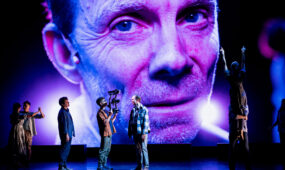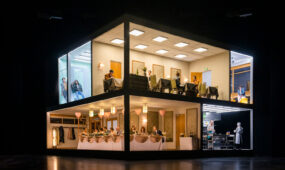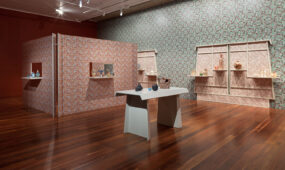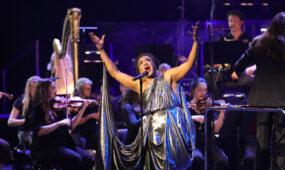Festival review: Anne Sofie von Otter
Adelaide Festival
While a flame-haired Englishman with a guitar had much of Adelaide entranced at Adelaide Oval last night, a snow-haired Swede without a microphone offered something very precious to a different crowd just a short stroll up King William Street.

Mezzo-soprano Anne Sofie von Otter has a reputation for being able to do it all and she only enhanced her legend last night in a wide-ranging, at times genuinely heartbreaking, program at the Town Hall – one of the landmark musical performances of this year’s Adelaide Festival.
von Otter, accompanied on this tour by young pianist Leif Kaner-Lidström and, in the second half, her guitarist son Fabian Fredriksson, has a voice of great power but which is most commonly marked by her restraint. Because of her perfect and precise diction and impeccable technique, she can nail a high note at a whisper, then expand to fill the room with her rich, distinctive tones.
Standing, without a microphone, with one hand resting on the grand piano, von Otter is a serenely commanding presence.
In the first half, she began gently, with a bracket of Swedish art songs before launching into five Jean Sibelius songs in Swedish and four glowing examples of Schubert Lieder.
That was all beautiful enough, but after the break she really grabbed the audience by the heart, beginning with “A Simple Song”, from Leonard Bernstein’s Mass (staged at the 2012 Adelaide Festival), an ironically complex song that made the most of von Otter’s control and dynamic range.
What came next was the delicate heart of this concert: a selection of music written by Jewish musicians in Terezin/Theresienstadt – a Nazi transit camp and ghetto in Czechoslovakia from which many inmates were distributed to death camps.
von Otter inhabits the doomed but defiant musicians in very moving fashion, from songs of yearning for home and children, to cheeky cabaret, interspersed with spectacular and virtuosic piano solos from Kaner-Lidström who, after a somewhat tentative beginning to the concert, really found his feet playing the jazz-influenced complex work of Czech composer Erwin Schulhoff (who died of tuberculosis in a concentration camp in 1942).
The bracket was capped by tremendous performances by von Otter of Adolf Strauss’s lilting operetta-style Ich wiss bestimmt ich werd’ dich wiedersehn (which translates, poignantly, as “I know with certainty that I will see you again” – Strauss died in the gas chambers of Auschwitz) and, finally, Ilse Weber’s haunting lullaby, Wiegala.
The formal loveliness of JS Bach ended the main program – some relief from the troubling juxtaposition of beauty and trauma that came before.
In a generous four-song encore, von Otter showed the versatility that makes her pop album with Elvis Costello, For the Stars, such a wonder.
She broke more hearts with a version of Bach-influenced American songwriter Judee Sill’s The Kiss, followed by a reflective rendering of Paul Simon’s Kathy’s Song, and, finally, played up to the crowd with two ABBA songs – I Let the Music Speak and, tongue-in-cheek, Thank You for the Music.

Get InReview in your inbox – free each Saturday. Local arts and culture – covered.
Thanks for signing up to the InReview newsletter.
Anne Sofie von Otter is playing at the UKARIA Cultural Centre in Mt Barker on Saturday and will be in conversation with David Marr at a Festival Forum at the Riverbank Palais on Friday.
Read more InDaily Adelaide Festival stories and reviews here.
Support local arts journalism
Your support will help us continue the important work of InReview in publishing free professional journalism that celebrates, interrogates and amplifies arts and culture in South Australia.
Donate Here






Comments
Show comments Hide comments